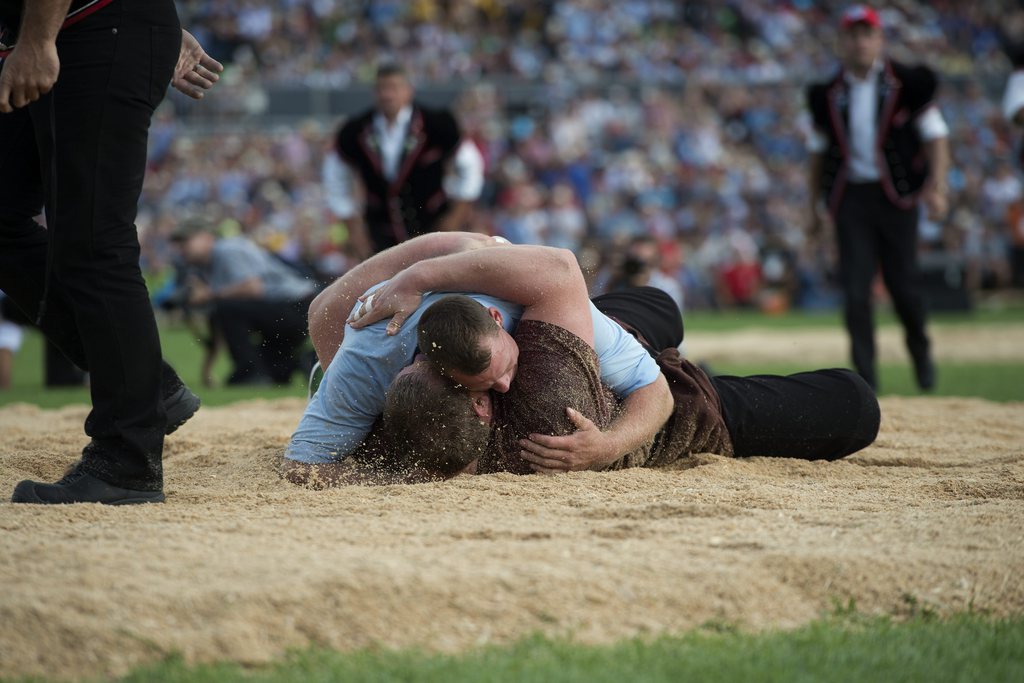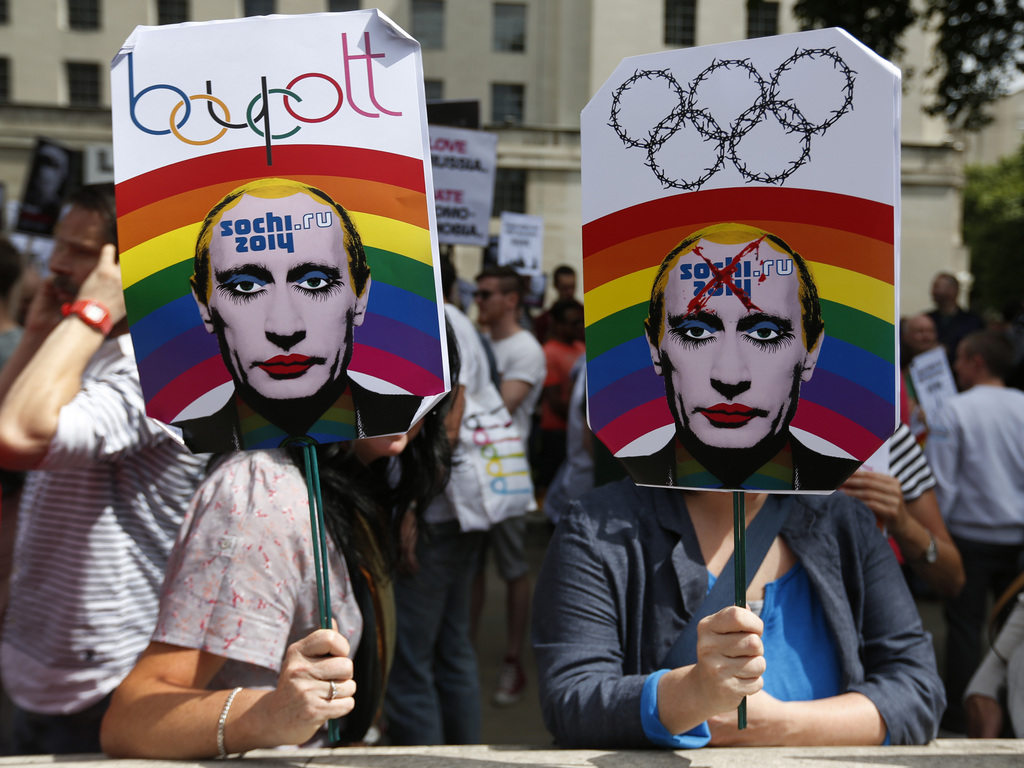Gays face tough road to asylum

For people persecuted for their gender identity, getting refugee status in Switzerland is a tall order because of vaguer asylum definitions than elsewhere in Europe. However, sensitivity to the issue is slowly increasing.
Samuel* struggled for years with not being able to buy things in a shop, see a doctor or get social services because of the stigma attached to homosexuality in Tanzania. But when his boyfriend was arrested, he realised he needed to leave his home country for good.
He paid someone to get him to Europe, eventually got on a train, took it to the last stop and ended up in a Swiss city where he found help and applied for asylum. Two years later, he’s still waiting on a decision from the authorities.
John* was publicly outed after he and others at a party in Uganda were rounded up, accused of assembling as homosexuals and formally charged with being idle and disorderly. He served a 40-day prison sentence during which he was raped and beaten. He finally escaped to Switzerland through a wealthy and well-connected contact.
Ifaenyi Orazulike is a gay activist who has travelled to Geneva from his home country of Nigeria for Thursday’s adoption of Nigeria’s Universal Periodic Review (UPU) by the United Nations Human Rights Council.
He says Switzerland isn’t really seen as a desirable place to seek asylum for Nigerian lesbian, gay, bisexual and transgender (LGBT) people because it is more conservative than other places and the asylum process is “too difficult”. Plus, he says the language barrier is more of a challenge than elsewhere.
Unknown number
There’s no way to know exactly how many people have sought asylum in Switzerland for the same reason as Samuel and John because, as the Federal Migration Office told swissinfo.ch, it only keeps regular statistics on general details like asylum seekers’ ages, genders and nationalities.
But the office’s Sibylle Siegwart estimates that asylum requests on the grounds of gender identity have generally increased over the past few years.
In his own attempt to quantify the number of LGBT asylum seekers in Switzerland, lawyer Martin Bertschi counted 90 such cases between 1993 and 2007. He estimated that only four of them got asylum.
Queer Amnesty, a division of Amnesty International, estimates a similar number have got refugee status out of the 60 or so LGBT asylum seekers it has worked with since November 2009.
“For several years now, homosexuals have been treated as a particular social group in the migration office’s asylum practice,” Siegwart says, explaining that asylum cases on the grounds of homosexuality fall into the category of persecution as a member of a specific social circle.
Asylum for LGBT people will continue to be a necessary option until basic rights can be secured in places like Nigeria and Malaysia, which will also finalise its Universal Periodic Review (UPU) before the UN Human Rights Council on March 20. While they ratified other UPU recommendations related to other issues, neither country accepted any suggestions related to LGBT rights.
Ifaenyi Orazulike points out that people tend to forget certain parts of the picture for LGBT asylum seekers, such as the fact that asylum isn’t centred on the West; African countries like South Africa take in many such asylum seekers as well.
Thilaga Sulathireh, a Malaysian activist who also travelled to Geneva for her country’s UPU, says she and fellow activists aren’t asking for much, and the Western agenda can complicate their message.
“LGBT issues are often painted as a Western issue of same-sex marriage, and there’s an assumption that everyone is asking for gay marriage,” she says. “We as LGBT human rights activists are lowering our standard by just asking that our basic rights [of freedom of speech, assembly and association] be protected, but authorities can’t even provide us this very low standard of human rights.”
Swiss situation
For Denise Graf, a refugee coordinator for the Swiss division of Amnesty International, that broad-brush categorisation doesn’t go far enough to protect LGBT asylum seekers.
“Since women’s issues were specifically added to Swiss asylum law [15 years ago] as a formal ground for asylum, we have had more positive decisions for things like genital mutilation, family problems, forced marriage or abuse. There’s more sensitivity there,” she says.
“We hoped that if the law was adjusted similarly [to mention LGBT people specifically], the same thing would happen in that category.”
Graf points out that “many countries in Europe have a more generous practice” than Switzerland when it comes to asylum for LGBT people, citing the example of an asylum seeker who ended up in Spain through the Europe-wide Dublin asylum accord. That person got asylum in Spain but probably wouldn’t have in Switzerland, she says.
The European Court of Justice declared homosexuality a stand alone ground for asylum in November 2013, but Switzerland hasn’t gone that far; the House of Representatives decisively voted against specifically including gender-based persecution in Swiss asylum law in 2009.
Tricky territory
“Not every gay asylum seeker is automatically granted asylum – he must be able to demonstrate that he is being personally threatened in his home country,” Siegwart explains.
Jakob Keel, a volunteer with Queer Amnesty who works one-on-one with LGBT asylum seekers, says that having to prove persecution and admit to being gay in front of Swiss officials can be extremely difficult and even traumatising for asylum seekers who grew up hiding in the shadows.
“I recently had to talk to an asylum seeker about what to say in front of the officials from the migration office. I explained the importance of telling them thoroughly what had happened to him, as he told it to me,” Keel says. “Normally he would never tell an official about being homosexual so he needed to be told how and why it was important.”
John is a prime example. When describing his experience to swissinfo.ch, he haltingly admits it’s hard for him to talk about and that he has been referred to a psychiatrist to deal with his outing.
“I came out when I least expected it, and it traumatised me a lot,” he told swissinfo.ch. “I try to put it far from my mind and forget about it.”
Recently, laws in Uganda, Nigeria and Russia have attracted the most attention.
Uganda’s president signed the Uganda Anti-Homosexuality Act into law on February 24, which includes lifetime imprisonment for homosexuality and support of LGBT issues. US Secretary of State John Kerry announced on March 18 that he would send homosexuality “experts” to Uganda to discuss the law with its president.
During a recent visit to Nigeria, UN High Commissioner for Human Rights Navi Pillay said a legal ban on same-sex marriage there violates international accords and could bring mob law against gays onto its streets.
In June 2013, Russia enacted an anti-LGBT propaganda law, purportedly to prevent distribution of ideas related to “non-traditional sexual relationships” among minors. Protests and boycotts over the law ensued during the 2014 Winter Olympic Games in Sochi, Russia.
Providing proof
Echoing Samuel’s struggles, Orazulike says LGBT people don’t flee just because they’re persecuted or attacked once; it tends to be because they can’t get access to education, health care or basic needs due to their sexual orientation.
Also as in Samuel’s case, Keel notes that many LGBT people are imprisoned for completely different reasons than their sexual orientation – although that’s really what’s behind it – making it especially hard for them to come up with proof of persecution when Swiss authorities ask for it.
Both John and Samuel say they were asked to produce such evidence that they can’t come up with now, since they left their home countries quickly and have no more ties to their former lives.
Samuel says he was asked over and over again during a ten-hour interview with migration authorities whether he would continue to be gay if he got asylum in Switzerland. He didn’t quite know what to say to that, he says, because “it’s not a choice”.
The migration office could not comment on the questions posed in this specific case. Siegwart says that such interviews can take between two and 10 hours to determine whether an asylum seeker’s story is believable and what details are relevant.
Shift in mentality
The Swiss News Agency recently reported that practices grounded in clichés were carried out by migration authorities in the past, for example determining whether an asylum seeker is gay by appearance or gestures, assuming a gay person would have had multiple partners or advising gay people to lead more conservative lives to avoid persecution. However, a slow shift in mentality has since taken place.
“Finding out whether an asylum seeker is really homosexual isn’t in the forefront [of asylum proceedings],” Liselotte Barzé-Loosli of the migration office told the news agency, adding that the main question is whether the person has a real reason for fearing persecution if they go back home.
Graf agrees things have changed for the better through dialogue and sensitivity training between organisations like Amnesty International and the migration office.
“We got rid of some thoughts that LGBT people could live in the closet and shouldn’t flaunt their homosexuality,” she says. “A certain sensibility was achieved, but that doesn’t mean there still aren’t problematic decisions.”
*Names withheld

In compliance with the JTI standards
More: SWI swissinfo.ch certified by the Journalism Trust Initiative












You can find an overview of ongoing debates with our journalists here . Please join us!
If you want to start a conversation about a topic raised in this article or want to report factual errors, email us at english@swissinfo.ch.